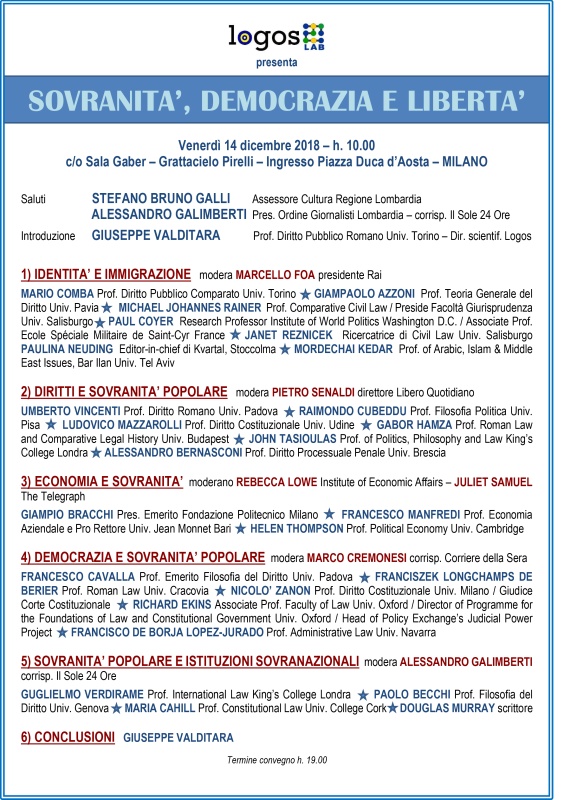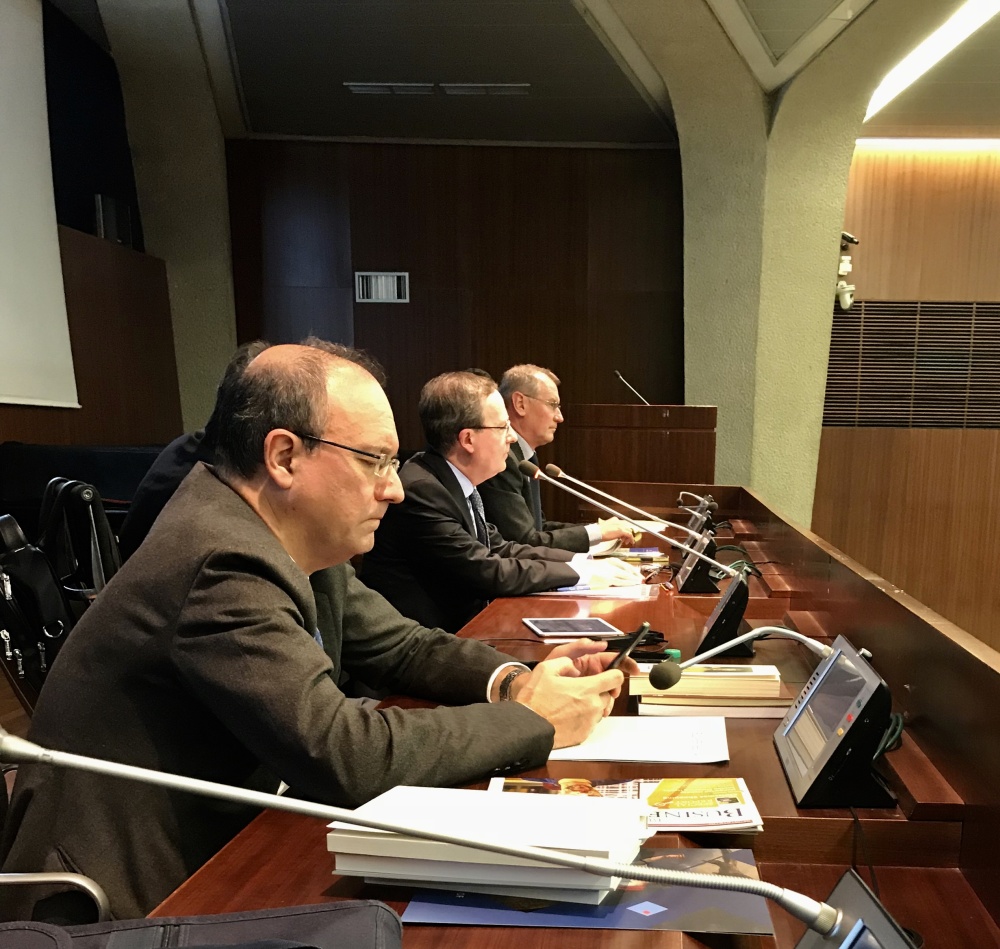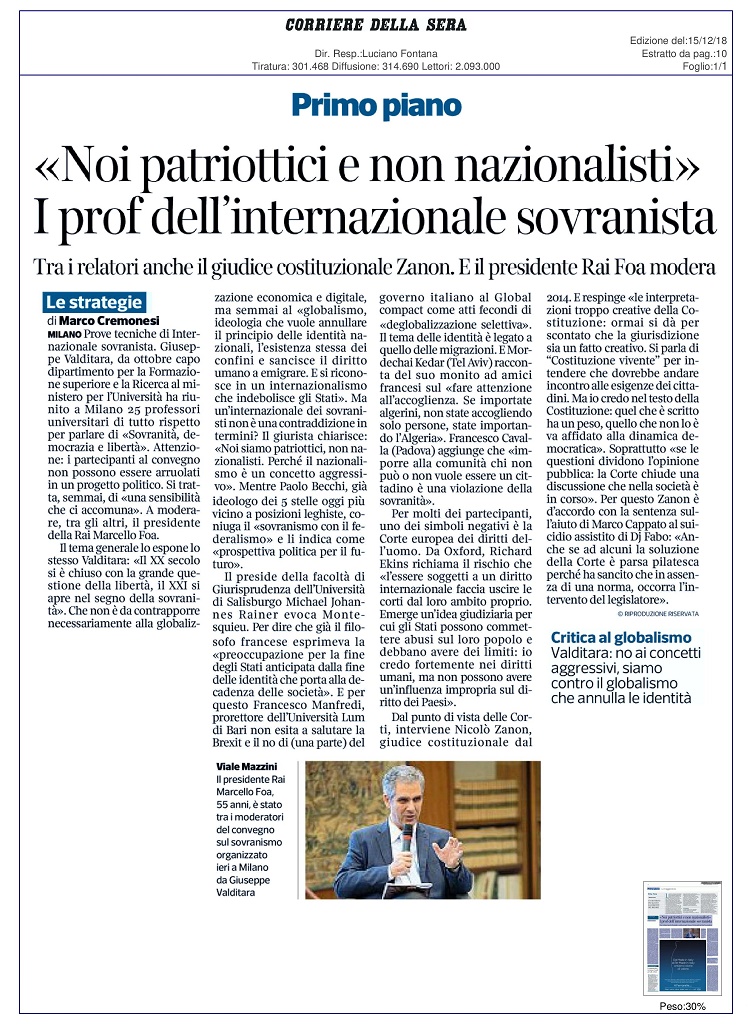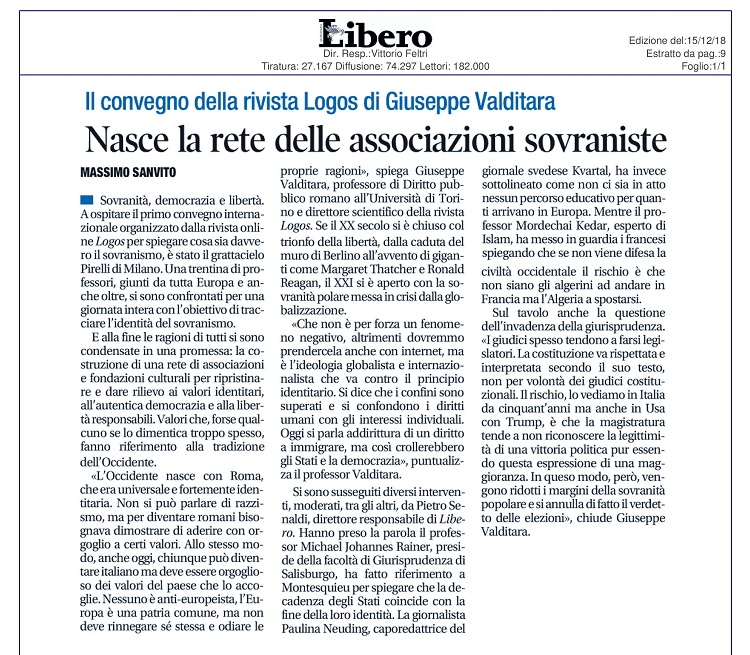 W Mediolanie ponad 200 osób – w tym wielu dziennikarzy – przysłuchiwało się w piątek, 14 grudnia 2018 roku obradom po włosku i angielsku nt. „Sovranità, democrazia e libertà” („Suwerenność, demokracja i wolność”), podczas których z referatami wystąpiło pięciu profesorów prawa rzymskiego:
W Mediolanie ponad 200 osób – w tym wielu dziennikarzy – przysłuchiwało się w piątek, 14 grudnia 2018 roku obradom po włosku i angielsku nt. „Sovranità, democrazia e libertà” („Suwerenność, demokracja i wolność”), podczas których z referatami wystąpiło pięciu profesorów prawa rzymskiego:
prof. Gabor Hamza (Uniwersytet Budapesztański) Costituzione, diritti e sovranità popolare
ks. prof. Franciszek Longchamps de Berier (Uniwersytet Jagielloński) L’identità giuridica e nazionale: la tolleranza e il pluralism,
prof. Johannes Michael Rainer (Uniwersytet w Salzburgu) Montesquieu: perdita di identità e decadenza
prof. Umberto Vincenti (Uniwersytet Padewski) La nuova religione dei diritti umani.
Prof. Giuseppe Valditara (Uniwersytet w Turynie) konferencję zorganizował, wprowadził do niej referatem programowym i podsumował całość osobnym wystąpieniem.
Obrady odbywały się one w pięciu panelach kolejno po sobie następujących.

Section 1: Identity and immigration – Moderator: Marcello Foa, President of “Rai” (Italian National broadcasting company)
1) The principles
Mario Comba (Italy), Professor of Comparative Public Law, Univ. Torino: The Constitutional Identity of the States Members of the European Union (L’identità costituzionale degli Stati membri nell’Unione europea)
Giampaolo Azzoni (Italy), Professor of General Theory of Law, Univ. Pavia: The Conditions for Hosting at the Origins of the Western World (Le condizioni dell’ospitalità all’origine dell’Occidente)
Michael Johannes Rainer (Austria), Professor of Comparative Civil Law and Dean of the Faculty of Jurisprudence, Univ. Salzburg: Montesquieu: Loss of Identity and Decadence.
2) The reality
PaulCoyer (USA), Research Professor, Institute of World Politics, Washington, D.C.;
Associate Professor, École Spéciale Militaire de Saint-Cyr, France: Nationalism and National Identity, in the Context of European-American Relations: What It Means ‘Being American’
Janet Reznicek (Germany), Researcher of Civil Law, Univ. Salzburg: Citizenship and National Identity. Examples: Germany, Austria, Canada
Paulina Neuding(Sweden), Editor-in-chief of “Kvartal”, Stockholm: Europe and Mass Immigration – a Challenge to Liberalism
Mordechai Kedar(Israel), Professor of Arabic, Islam and Middle East Issues, Bar Ilan University, Tel Aviv; member of the International Institute for Migration and Security Research (IIMSR): Islamic Views about Migration
Section 2: Rights and sovereignty of the people – Moderators: Pietro Senaldi, Editor-in-chief of “Liberoquotidiano”
Umberto Vincenti (Italy), Professor of Roman Law, Univ. Padova: The New Religion of Human Right (La nuova religione dei diritti umani)
Raimondo Cubeddu (Italy), Professor of Political Philosophy, Univ. Pisa: The Conservative State between Duties of the Citizens and Hypertrophy of the Human Rights (Stato liberale fra doveri civici e ipertrofia dei diritti umani)
Ludovico Mazzarolli (Italy), Professor of Constitutional Law, Univ. Udine: Fundamental Rights and Citizenship (Diritti fondamentali e cittadinanza)
Gabor Hamza (Hungary), Professor of Roman Law and Comparative Legal History: Constitution, Rights and Sovereignty of the People
John Tasioulas(United Kingdom), Professor of Politics, Philosophy and Law, King’s college, Londra: Human Rights Overreach
Alessandro Bernasconi (Italy), Professor of Criminal Procedure Law, Univ. Brescia: Political Acts between National Interest and Jurisdiction (Gli atti politici fra interesse nazionale e giurisdizione)
Section 3: Economy and sovereignty – Moderators: Rebecca Lowe, Institute of Economic Affairs,and Juliet Samuel, journalist at The Telegraph
Giampio Bracchi (Italy), President Emeritus of the Foundation of “Politecnico Milano”: International Finance and National Politics (Finanza internazionale e politiche nazionali)
Francesco Manfredi(Italy), Professor of Business Administration and Acting Dean Univ. Jean Monnet, Bari: Territorial Systems, Socio-Economical Development and Sovereignty (Sistemi territoriali, sviluppo socio-economico, sovranità)
Helen Thompson(United Kingdom), Professor of Political Economy, Univ. Cambridge: Whether Britain could have stayed in the European Union
Section 4: Democracy and sovereignty of the people – Moderators: Marco Cremonesi, journalist at Corriere della Sera
Francesco Cavalla (Italy), Professor Emeritus of Philosophy of Law, Univ. Padova: Who Are the ‘Sovereign People’? (Chi è il ‘popolo sovrano’?)
Franciszek Longchamps de Berier (Poland), Professor of Roman Law, Univ. Krakow: Title in pending
Nicolò Zanon (Italy), Professor of Contitutional Law, Univ. Milano, Judge of the Constitutional Court: Judges and Law (Giudici e legge)
Richard Ekins (United Kingdom), Associate Professor in the Faculty of Law, Univ. Oxford; director of the Programme for the Foundations of Law and Constitutional Government, Univ. Oxford; Head of Policy Exchange’s Judicial Power Project: Self-Government in an Age of Over-Mighty Courts
Francisco de Borja López-Jurado (Spagna), Professore di Derecho administrativo, Univ. Navarra: The Search for Meaning in Democratic Decision-Making: the Legal Traceability Method
Section 5: The sovereignty of the people and the supranational institutions – Moderator: Alessandro Galimberti, journalist at “Il Sole 24ore”
Guglielmo Verdirame (United Kingdom), Professor of International Law, King’s College, London: Sovereignty and International Law
Paolo Becchi(Italy), Professor of Philosophy of Law, Univ. Genova: The Two Concepts of Sovereignty, the Crisis of Globalization and the Reinassanceof the National State (Le due idee di sovranità, la crisi della globalizzazione e la reinassancedello stato nazionale)
Maria Cahill (Eire): Professor of Constitutional Law, Univ. Cork: Supranationalism and Sovereignity
Douglas Murray (United Kingdom), Writer: The strange death of Europe

Artykuły prasowe:


